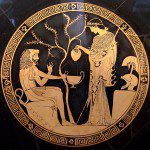There are good teachers in all Pagan paths. There are also folk who will take your money and spin you self-important rubbish that will be of little use to you. How do you tell what you’re looking at?

1) Cost. A good teacher may or may not charge. They probably won’t charge for things that cost them little time or effort, but they will charge you for books, and may well charge for formal teaching. You will be able to see some correlation between innate costs (time, room hire, etc.) and what you are paying. A Plastic Pagan Guru will tend to charge way over the odds, or, won’t charge but will then try and persuade you to part with money in a less structured and on-going way.
2) Claims. A good teacher will not make wild claims about the power and knowledge you will have at the end of the course. The promises of wealth, power, inner peace and so forth are enticing, but also rubbish. No one can give you that in a short time frame, you will only achieve such things with a lot of hard work. If it sounds too good to be true, it is, and you’ll pay a lot for very little.
3) Humiliation: A good teacher does not humiliate their students. A person who is in it to feel powerful and important will do exactly that: either by making impossible demands, asking questions you could not possibly answer, or otherwise showing you up, the Plastic Pagan Guru will make sure you feel small, unworthy, and in awe of them.
4) Great Mysteries: The Plastic Pagan Guru will make it clear they have access to secret knowledge, insight into mysteries and special power. Nothing they teach you will allow you to get anywhere near that. Ever. There will never be proper detail or clear information, only the message of their innate superiority. Your not managing to learn the mysteries will be ascribed to your shortcomings.
5) Self Promotion: Your Plastic Pagan Guru expends a lot of effort on image, on looking the part, and talking themselves up. Everything revolves around them. Sycophants are welcome, people who ask questions will be called unreasonable and unspiritual and sent packing. If only blind adoration is acceptable, you do not have a good teacher. What they say sounds amazing, so long as you do not try and poke beneath the surface. Grandiose statements, incredible claims, stunning achievements and adoring followers are all part of the parcel for your Plastic Pagan Guru. Good teachers often have more requests to teach than they have time, and do not therefore spend much time marketing themselves.
6) Great Enemies: Normal people don’t go around collecting enemies and having on-going magical wars with them. Plastic Pagan Gurus quite often have a dreadful nemesis who fights them on the astral planes. You are to understand from this that the PPG is not to be messed with and has recourse to serious power if attacked or offended in any way.
7) Unnamed teachers: Regular Pagans are a mix of self-taught, book taught and people taught, maybe with some divine inspiration in the mix, and they will usually happily tell you how that mix works. The PPG has mystical teachers who are alluded to but never described. They may be spirits, or gods, or something of that ilk, but there won’t be much detail, and certainly nothing will be said that could allow you to ask questions. The teachers give them special authority. They may claim an ancient tradition of family knowledge, access to some special resource or another, but you will never see it and you will never hear any details, never be able to learn from it, and you won’t know enough to be able to question the veracity, either.
8) Titles: Regular Pagans do end up with titles, usually ones that are effectively job descriptions. Functional titles are sane and fine. PPGs collect titles like other people collect stamps. Expect multiple titles implying status and connecting them to a whole host of different traditions. You will hear about these titles; they will not be a secret. You will not hear much about what the PPG did to earn them.
9) Answering Questions: Good teachers welcome questions, and aren’t afraid to admit when they do not know. Good teachers enjoy independently minded students who want to think for themselves. Plastic Pagan Gurus hate being asked questions, unless those questions are along the lines of ‘how did you get to be so amazing?’. The more difficult the question, the less popular you will be. The PPG always makes it clear they know the answer, but will imply that knowledge rather than sharing it.
10) Plastic Pagan Gurus hate competition. Anyone doing anything in an area they have designated as ‘their territory’ will be an affront to them and they will try to shut it down. Methods vary but are seldom pleasant.
On the surface, Plastic Pagan Gurus are convincing. They appear to be everything we want Pagan leaders to be, and they play to those desires. It can take a long time to realise that you’re being sold a pile of nothing wrapped in PR. None of us enjoys the moment of realising we’ve gone along with something, so watch out for those ‘Emperor’s New Clothes’ scenarios. Be the person who can admit it’s a sham, don’t get so caught up in your own self-importance that you go along with the show rather than admitting you were duped. If we all stop feeding the egos of the Plastic Pagan Gurus, they will have no reason to keep peddling their goods.
Druid Thoughts is published on occasional Wednesdays on Agora. Follow it via RSS or e-mail!

















